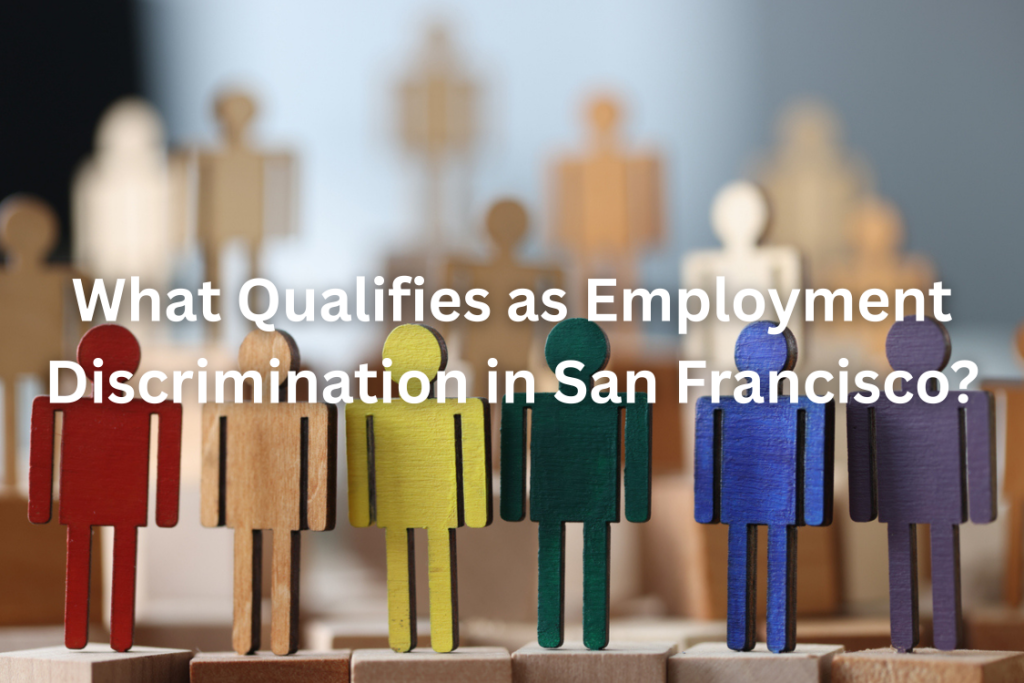Employment discrimination is one of the most common issues employees face in the workplace, even in diverse and progressive areas like San Francisco. Despite decades of civil rights advancements, workers still experience unfair treatment based on characteristics that have nothing to do with their skills or performance. Knowing what qualifies as unlawful discrimination is the first step toward protecting yourself and holding employers accountable.

Legal Protections Under Federal and State Law
At the federal level, several laws protect employees:
- Title VII of the Civil Rights Act of 1964 prohibits discrimination based on race, color, religion, sex, and national origin.
- The Age Discrimination in Employment Act (ADEA) protects workers over 40 from age-based discrimination.
- The Americans with Disabilities Act (ADA) requires reasonable accommodations and prohibits disability-related bias.
- The Pregnancy Discrimination Act (PDA) makes it clear that pregnancy discrimination is a form of sex discrimination.
- The Equal Pay Act requires equal pay for equal work.
California goes even further through the Fair Employment and Housing Act (FEHA), which protects employees from discrimination based on sex, gender identity, marital status, sexual orientation, medical conditions, military status, and more. FEHA applies to employers with five or more employees, meaning that most workplaces in San Francisco are covered.
Common Forms of Discrimination in San Francisco Workplaces
Discrimination may show up in many ways, including:
- Hiring and Promotions: A woman denied a promotion in favor of a less-qualified male coworker.
- Unequal Pay: Tech employees discovering that women earn significantly less than men in the same positions.
- Unequal Assignments: A company assigning Latinx or Asian workers to lower-paying roles despite qualifications.
- Different Standards: Dress codes or attendance rules applied more strictly to women or employees with diverse backgrounds.
- Termination or Demotion: Pregnant employees being fired after notifying their employer of their pregnancies.
Hostile Work Environments
Discrimination does not have to involve a firing or demotion. If a workplace becomes hostile because of repeated offensive comments, jokes, or treatment based on race, sex, pregnancy, or other protected categories, the law recognizes this as unlawful. Examples include:
- Male coworkers making offensive jokes about women in leadership.
- Managers mocking pregnant employees or refusing to accommodate medical needs.
- Ongoing racial slurs or derogatory remarks tolerated by supervisors.
If the conduct is severe or pervasive, it may create a legally hostile work environment.
Retaliation Is Illegal
Employees often fear retaliation when reporting discrimination. However, both Title VII and FEHA prohibit retaliation for filing complaints, testifying, or opposing discrimination. Retaliation can include demotions, exclusion from meetings, increased scrutiny, or firing. These actions are themselves separate violations.
Recognizing and Responding to Discrimination in the Workplace
Employment discrimination cases are complex. Employers may deny wrongdoing or argue that decisions were based on performance rather than bias. At Lawless, Lawless & McGrath, we’ve represented employees across San Francisco for decades. We know the tactics employers use, and we know how to prove discrimination under California and federal law.
If you suspect discrimination, documenting incidents and seeking experienced legal counsel are critical first steps. You don’t have to face it alone. Our attorneys are here to help you protect your career and your dignity.
